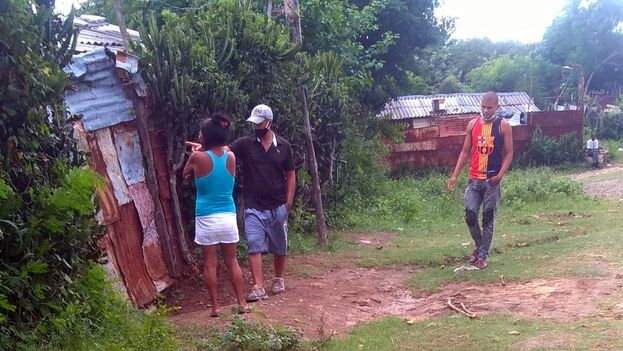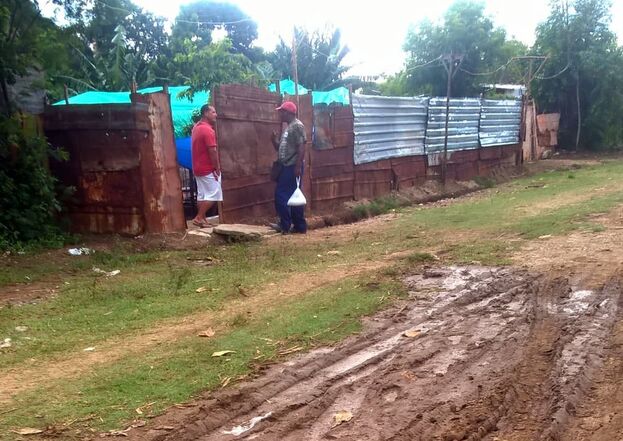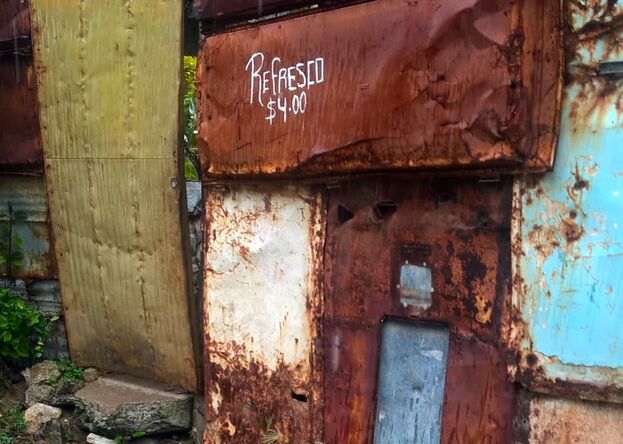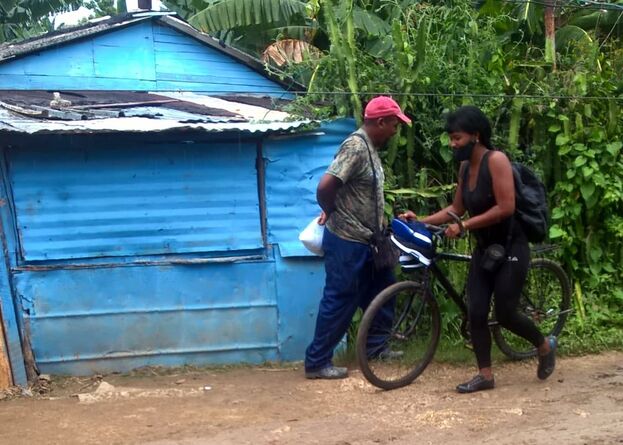
![]() 14ymedio, Alberto Hernández, Santiago de Cuba, 7 November 2021 — Like thousands of families on the outskirts of Santiago de Cuba, Eugenio lives in a settlement that has no electricity, water or sewage services. The houses, located behind the Micro 9 buildings in the José Martí district, are made of scraps of wood with pieces of cardboard, sheets of zinc and dirt floors.
14ymedio, Alberto Hernández, Santiago de Cuba, 7 November 2021 — Like thousands of families on the outskirts of Santiago de Cuba, Eugenio lives in a settlement that has no electricity, water or sewage services. The houses, located behind the Micro 9 buildings in the José Martí district, are made of scraps of wood with pieces of cardboard, sheets of zinc and dirt floors.
“I arrived and ‘planted’ myself in a grassy field,” says a 29-year-old parks guard about his settling on this site with his wife Victoria three years ago. “We both needed a place to settle down because I lived with my mother in a tenement on Paseo Martí. Piled up in one room, five people lived together, and my wife’s family was going through an even worse situation.”
The houses in this neighborhood are called ‘llega y pon‘ (literally ‘arrive and put’ — a term used for a ‘shantytown’), explains Eugenio, “because you are simply looking for a space and, if you find it, you put four pieces of sticks, you tie a wire to it as a fence and build your own.” But now, he clarifies, there is hardly any place to be found: “Everything is full.”
A surprising detail is that homes in these places are in high demand. “For my own house, even with a dirt floor, built with scraps of zinc, cardboard and fenced with black sheeting, they have offered me up to 50,000 pesos,” says Eugenio, who has rejected the offers because he would have to come up with more than 150,000 additional pesos to aspire to buy at least one apartment, something impossible for his finances.

Working as guard in the network of parks in the city, this young man, who has qualified as a skilled lathe operator, earns a salary of 2,200 pesos. To have extra money, he sells bags made from rice sacks, hand-sewn by his wife. “In these years we have only been able to equip ourselves with a black and white television for the little ones and a radio, and we are saving to see if we can buy a Creole Cold (refrigerator), because we have a baby on the way and this equipment is important,” he says.
The housing situation in Cuba is one of the problems that the Revolution undertook to solve when it gained power. However, after 62 years, the situation is increasingly critical and, on the outskirts of the cities, these types of settlements continue to proliferate in difficult conditions.
In Santiago de Cuba there are examples of this not only in Micro 9, but also in Altamira, Marimón, Indaya, La Risueñita, El Caney and Chicharrones. From a housing stock of 159,696 dwellings, according to official data, this city counts 48,579 houses in poor condition.
In addition, this year the province this year has failed to meet its housing construction plan, which violates the provisions of Article 71 of the Constitution, which recognizes “the right to adequate housing and a safe and healthy habitat.”

As Eugenio and Victoria do not have a property registry of the house — with an address — they also do not have access to their own ration book, and each one purchases the food allotted to them at the ration stores from their official addresses. Neighbors also sell food and other products on the street and in stalls that they set up at the entrances of the houses.
Outside of the city’s infrastructure, services such as barbershops and manicures are performed in the settlement by people at home. “This is a hamlet with several hundred houses and yet there are no shops, clinics, bakeries or anything. The closest school is about a kilometer from here,” laments Eugenio.
And how do they get electricity? “The electrical wiring here is a tendedera [‘clothesline’, as the makeshift wiring is called], which consists of illegal installations on rustic poles, connected to the electrical network. People improvise and connect cables,” confesses the young man. “All of this has created a low-voltage zone. For example, in my house, if I turn on the electric stove after six in the evening, the lights go out.”
The conversation is interrupted by a young woman dressed in black with a backpack on her back and sports shoes on the handlebars of her bicycle. “Neighbor, I have new tennis shoes, from size 41 to 44, in various colors, at 4,000 pesos,” she offers. Eugenio replies: “I’m broke, my friend, more holes than fabric.”
Victoria, who is only 23 and a housewife, is most affected by the lack of water. “Cooking and washing is a problem,” she explains. “We have two old tanks that can hold barely enough for three days. We live carrying buckets, because there is no potable water service here. We bring it from a neighbor’s house through a hose.”

The problem with water is not only the supply, but also the drainage. When you wash or scrub, Victoria says, you have to be very careful that dirty water does not fall into the pit they have, to prevent it from filling up. “Once it overflowed and I don’t even want to think about it, the dirt floor was soaked with sewage water and the stink was horrible.”
The situation worsens these days, in the rainy season. “Everything is flooded, the road fills with mud and you have to go out with old boots or shoes, and then change to go out to the paved street. You have to carry the children to school and the older ones arrive muddy just like their parents,” says the young woman.
Not to mention security, which the Cuban government also tends to boast about as an achievement of the Revolution. Victoria denies it: “In this place a lot is stolen from houses and especially at night. I panic when my husband has to stand guard at night, I had to get a dog, at least to bark.”
“What we are experiencing is not poverty or misery; it is a ruin!” exclaims Eugenio. He reproaches the authorities for their indifference towards all these “young people like us” who live in neighborhoods abandoned by the State. “We want a change and we are going to say so on November 15.”
____________
COLLABORATE WITH OUR WORK: The 14ymedio team is committed to practicing serious journalism that reflects Cuba’s reality in all its depth. Thank you for joining us on this long journey. We invite you to continue supporting us by becoming a member of 14ymedio now. Together we can continue transforming journalism in Cuba.
